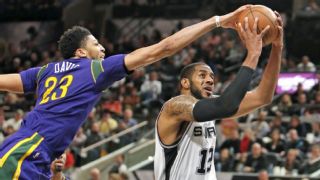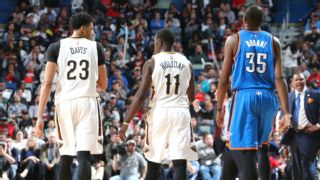|
NEW ORLEANS -- The Kevin Durant who entered the NBA is almost unrecognizable today. Nineteen years old. No chin hairs to tug on. An even spindlier body sheathed in green and gold. Photos of the then-starting shooting guard for the Seattle SuperSonics might as well come decorated in scratch-and-sniff stickers. Durant stuck out at times back in the 2007-08 season, too. "In my first year in the league, we had four guys in their 30s who had three or four kids," he says. "You really can't relate to those guys; you really can't talk to them too much." But he did have Jeff Green, a 22-year-old forward drafted three spots after him. The next season, when the franchise packed up and moved to Oklahoma City, they brought 20-year-old Russell Westbrook with them. The season after that came James Harden, 20, and Serge Ibaka, also 20. By Durant's fourth season, Nazr Mohammed was the only regular left over 30. For Durant, who played at three different high schools in the DMV area, a season of college ball at Texas and a season in Seattle before settling in OKC, having guys around him with similar ages and interests made the adjustment to NBA life much easier. "When you come into the league at 18, 19 years old, you want to win, but you also just want to grow and get better, and experience some stuff," Durant says. "But as you get older and taste winning, that's more important. You'll grow along the way. It's good to have people that can relate to you, that can see new things with you, that go through new situations with you. It's definitely helped me out, and made me appreciate some of the teammates that I have. "Having Jeff Greens, James Hardens, Russells, Daequan Cooks -- guys along the way that you grew with, that have similar interests -- it makes coming in and playing and working even better, because they're your brothers, they're your teammates, they're your friends. It's a little bit more fun that way, too."  Anthony Davis also began his NBA career at 19. Back in 2012-13, when the Pelicans were still the Hornets and The Brow was less of a brand and more of a personal grooming choice, New Orleans was replete with young talent. Austin Rivers (20) was drafted nine spots after Davis. Al-Farouq Aminu (22) and Eric Gordon (24) were the dowry paid to hand Chris Paul over to the Clippers. Ryan Anderson and Robin Lopez (both 24) were acquired via trade that offseason. The youth movement ended there. Unlike the Thunder, the Pelicans built around their future superstar by trading for established 20-somethings with untapped upside rather than finding them in the draft. They dealt two first-round picks (ultimately used to select Nerlens Noel and Elfrid Payton) for Jrue Holiday, another first (Sam Dekker) for Omer Asik, and worked out a sign-and-trade for Tyreke Evans. Today, their roster has an average age of 27.1, 13th-oldest in the NBA, and features one player acquired through the draft. Davis, 22, is the youngest player on the team, just like he was in each of his previous three seasons. "It's a positive and negative thing," Davis says. "Positive [because] you get to learn from other guys, get a lot more experience and knowledge from guys who are older than you and have been through the league. But at the same time, you always want [to be able to say], 'Man, I remember when he was the same age, when we were both 22,' or whatever. As you get older and see how both of you guys' games developed. I've had guys on the team who were like that, who end up leaving. But we always just stay in contact and follow each other's games. "But it's good to have older guys around me to bring a lot of knowledge and experience to my life." A lot of it this season has come by way of Kendrick Perkins, a 31-year-old bruiser with one championship ring, three NBA Finals appearances and a soft spot for mercurial point guards. "I just make sure he just tries to keep a clear head," Perkins says. "The biggest thing with AD is you don't want to put too much on a young guy. You just want to let him to go out there and play basketball, play freely. The thing is, you want him to be able to think the game but you gotta make sure he keeps a clear head, stay away from all the distractions and be able to lock in and focus on what [he's] gotta do." Perkins was 19 as a rookie, too. Though after 12 seasons he now struggles to keep up in the Pelicans' speedy, spread-out offense, a résumé with stints alongside a Mount Rushmore of the modern era -- Kevin Garnett, LeBron James, Durant and Westbrook -- has provided him plenty of perspective, which he shares with the gravitas of a (menacing) sage. "I think nowadays it's more so the IQ for the game," Perkins says. "A lot of young guys that's comin' in, they're athletic and they run fast and they can do all those things, but they don't have an IQ for the game, basketball IQ. They can't think of things on the flyby. It gotta be rehearsed. I think that's when you step your game to another level is when you can do things on the fly." Bypassing that necessary learning curve, during the years when Davis' rookie deal was among the biggest bargains in the league, was the apparent main advantage in acquiring complementary talent with no assembly necessary. Though Davis is now just eight days shy of his 23rd birthday, his game, as they say, has long been far beyond his years. His player efficiency rating has ranked seventh or higher in each season except his first, in which he finished 15th.  But with the Pelicans ranking in the top five in games missed because of injuries in two of Davis' four seasons, according to data from Jeff Stotts of InStreetClothes.com, the franchise has witnessed neither short-term success (.424 winning percentage in the past four seasons) nor the unbridled enthusiasm of Davis leading a young core into the future (only one other Pelican has a single-season PER above 20 since Davis entered the league in 2012: Holiday, this year). "Usually your best player is the most vocal guy, a leader and things like that," first-year Pelicans coach Alvin Gentry said. "He's getting to that point, but I think for him, there's still so many veteran guys on this team. And there is a respect factor that he has. He respects the game and respects guys that have already carved their way through. I think that they know that this is his team. But he's not ready to do that verbally yet. He's gonna play hard and compete every night, and that's more important right now than being the so-called vocal leader on the team." The Thunder's path is hardly a five-step model for success. The franchise renowned for building from the bottom up ended up trading Green, Durant's first running mate, three years after that final Seattle season for Perkins in an attempt to leap into contention. They dealt Harden and Cook 18 months later. The only apparent commonality in the building of title teams over the past decade is the presence of a transformative player. The Pelicans have yet to prove that they can build the necessary roster around him, but Davis, at least, is doing his part. "I think you can use a vocal guy, but it's got to be done in the right way. I think any team needs that," Gentry said. "But San Antonio is basically a quiet team. Kawhi [Leonard] is not gonna be a guy that says a lot. I think leading by example and things like that is always good. I'm sure, if you're a quiet guy and you're getting 22 [points] and you're a lockdown defender and leading the league in 3-point shooting, I'm sure the coach is OK if you don't say a whole lot."
|

